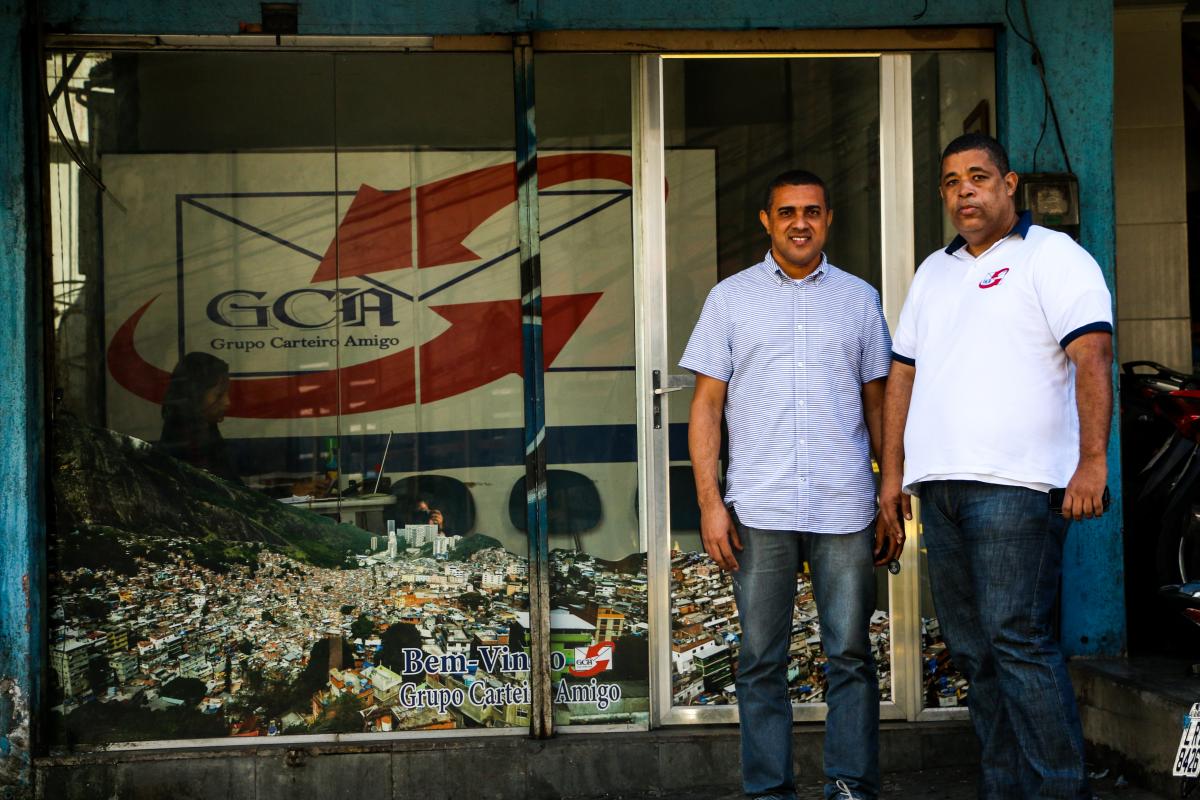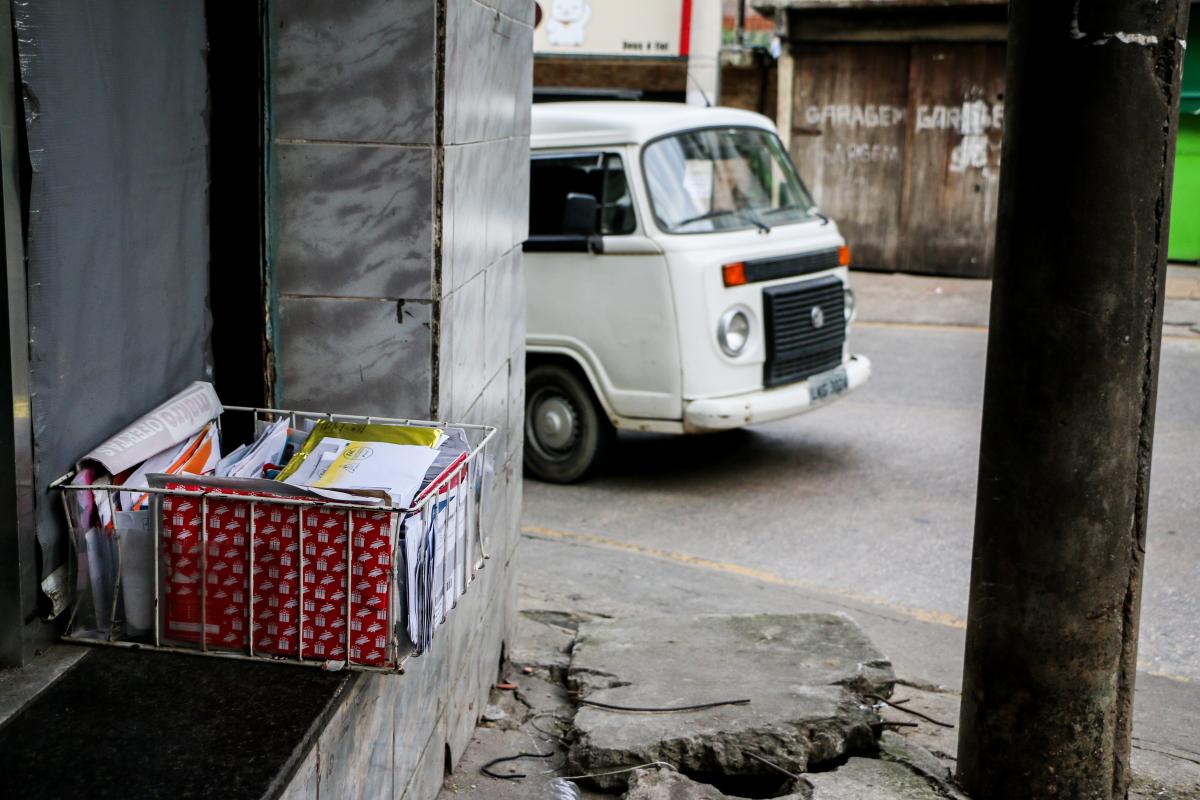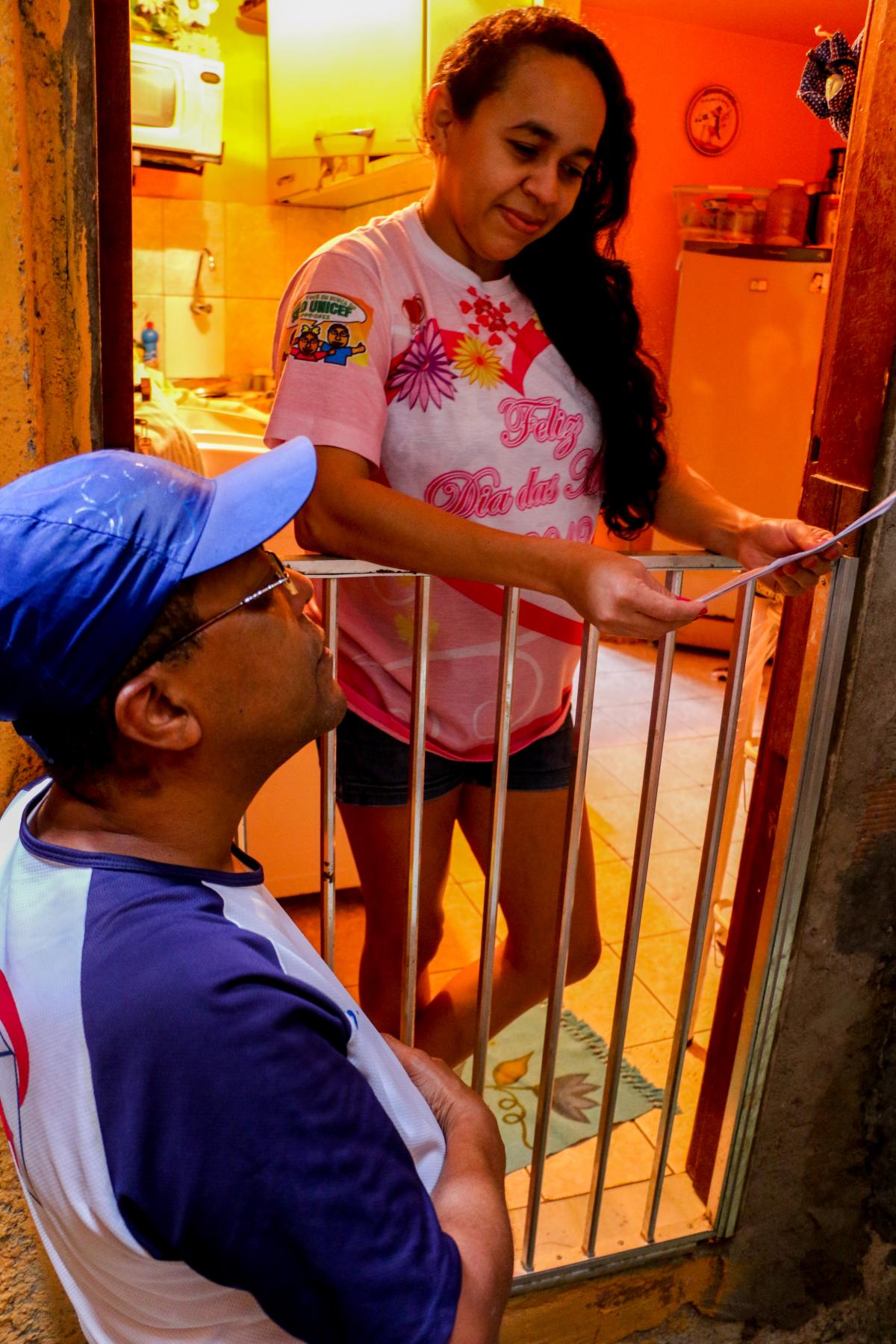Where the Streets Have No Name
In an age when communications are becoming increasingly digital it is easy to forget how much still depends on paper and postage, but amidst the chaos and violence of Brazil’s largest slum, three entrepreneurs have made a small fortune by providing a basic service—delivering mail.
Cover Photo: Nelson José da Silva, a Friendly Mailman delivery person brings the post of one of the company’s thousands of clients. Customers pay R$18 (about US$5.10 or €4.50) a month for the service. The house will receive a sticker with a unique number recognised only by Friendly Mailman, part of a system that makes it possible to deliver thousands of items a day to people who have no officially recognised address. (Photo: Leandro Lima)
In 1946 Brazilian singer Isaurinha Garcia recorded ‘Mensagem’, her biggest hit, in which she sings that she is surprised to receive a letter at her own home. In those days Rocinha was exactly what its name means: a small farm, an area where half a dozen people grew fruits and vegetables to sell in the richer districts of Rio de Janeiro. Today, it is Brazil’s largest favela, a slum neighbourhood with a population variously estimated from 63,000 (according to the 2010 census) to 120,000 (according to the number of registered electric-company customers). And still today, although Rocinha has a relatively well-developed infrastructure and even its own local television channel, its residents are pleasantly surprised to be visited by an official postal carrier. These men and women in their blue-and-yellow uniforms are semi-mythical creatures: everybody knows that they exist, but few have actually seen them in the flesh. The reason for their scarcity is that Rocinha is a daunting maze of unnamed streets and unnumbered houses, impossible terrain for Correios, the state-owned postal service, but not for Carteiro Amigo or, in English, Friendly Mailman.
‘At my house, I have never seen a mailman,’ says 44-year-old co-founder of Friendly Mailman, Rocinha native Carlos Pedro. ‘For those living outside the favela this seems unbelievable, but not for us. This is not a condominium with a 24-hour doorman. People work all day long. They cannot waste time waiting for a parcel or going to the post office to check if a letter has arrived for them.’ Some items, however, (credit cards and official correspondence, for example) are only delivered by the post office if the addressee signs a receipt.

Carlos Pedro (on the right) with Sila Vieira, founders of the Friendly Mailman. Pedro used to work for the Census bureau, a frustrating job in an area where most people don’t have an address. They decided to take matters into their own hands and propose a system of virtual addresses that ensures postal delivery to any one of the 60,000 residents of Rocinha, the populous favela of Rio de Janeiro.
Residents searched for a solution for years. The first attempt to organise a delivery service consisted of improvised receiving stations where Correios postal workers would leave the mail for a certain number of streets in a cardboard box for residents to collect. The system, still in use in some remote areas, was notably insecure and did not solve the problem of deliveries that depended on signing a receipt. ‘It was really a huge problem,’ says Sila Vieira, 45, also born and raised in Rocinha and co-founder of Friendly Mailman. ‘But we only managed to measure its true dimensions when we took part-time jobs as census takers.’ Pedro agrees. ‘Every time we asked if the residents had something they wished to add to their community, they would complain about the lack of mail delivery. We decided that at the end of each interview we would place one more question about mail service. Then we realised it really was an issue for many people.’
‘At first, we would personally talk to the residents and deliver their correspondence. One of our first customers wept with emotion as he received a document from the welfare system for which he had waited for months. It was the notice of his retirement,’ recalls Vieira.
Where many people only saw a dilemma, Pedro, Vieira and Ramos found an opportunity. A big one. They bid their low-paid office jobs farewell and started a new life. ‘We went door-to-door, explaining what Friendly Mailman would be. To attract customers, we offered to deliver first and postpone the payment to the next month. Our first rate was 3 Brazilian reals (approximately US$5.40 or €5.85 in 2000). The residents were so enraged with our government’s postal agency that they trusted us blindly,’ says Vieira.
You seem to enjoy a good story
Sign up to our infrequent mailing to get more stories directly to your mailbox.The first step in their plan was to find a way to give structure to the chaos of the favela. Unplanned and unregulated, Rocinha had no official streets, let alone an official map. Even today, many streets have three names: one given by the residents (usually the most frequently used); one assigned by the power company, and a third designated by the city, which appears on the street signs. House numbering is similarly unsystematic, and house number 20 may very well stand next to house number 231. But Ramos, Pedro and Vieira knew Rocinha’s streets and alleys like the backs of their hands, and they devised a new coding system, giving each house registered with Friendly Mailman an individual ID.
This simple idea has become a successful business. Today, more than 4,000 houses are registered with Friendly Mailman, benefiting about 20,000 customers. ‘We have opened a franchising system. Now, Friendly Mailman is in 12 favelas,’ says Pedro.
Customers pay R$18 (about US$5.10 or €4.50) a month for the delivery service. It’s not cheap—Brazilian minimum wage is around R$788 (US$225 or €198)—but it allows residents to fulfil two dreams: to have a credit card and to make purchases over the Internet. Chinese websites that offer all sorts of merchandise at rock bottom prices are very popular all over the country, and Rocinha is no exception. More than a payment system, the credit card represents a social phenomenon: the rise of the poorest classes to the consumer market over the last ten years. It may seem like a small thing, but a new credit card opens a window of opportunity to its owner.

There are no official names for most of the streets in Rocinha, so the Post Office van stops by the Friendly Mailman office and leaves all the mail for the entire community. Friendly Mailman sorts and delivers everything, accomplishing what the official postal service cannot. (Photo: Leandro Lima)
‘To receive parcels, I needed to use my work address because the post office does not deliver to my house. But the packages went to the mall’s general management office, and they began to complain,’ says Antony George Peres da Costa, 28, a former waiter at an upmarket shopping mall near Rocinha.
Besides tending tables, Costa was learning to repair computers, smartphones and other electronic equipment and needed to buy components over the Internet. Friendly Mailman solved his problem. ‘I didn’t have any trouble with orders any more. I was able to save money and open a store. Without the service, it would have been impossible to start my own business. Today I have my own address, but I still use Friendly Mailman because they get everything to me, anytime I need it.’
Costa’s case reveals another challenge of delivering correspondence in Rocinha: most of the residents work all day long. Nobody can afford to stay home to wait for letters, packages or other deliveries.
In Brazil, the word ‘asfalto’ signifies the neighbourhoods of higher social classes, where the streets are paved and the houses have piped water and a sewer system. In most favelas only the main streets are paved, and very few houses have drinking water.
‘Get the picture: Rocinha, over 100 degrees in the shade,’ says Pedro. ‘Two guys climb more than 500 steps with a refrigerator on their backs. They look around here and there and finally find the address. So they knock on the door. Nobody is there. In the past, this situation happened many times. Magazines refused to deliver goods in Rocinha, Today, customers give our address and we receive the merchandise for them.’
Having a regular mailing address is changing the life of 34-year-old Mirla Maria Matos Rodrigues. Since coming to Rocinha the mother of two has had half a dozen different apartments because demand for rental properties is very high, and landlords raise rents as they see fit, but she depends on reliable delivery of the beauty products that she sells door-to-door. ‘The postman only delivers to central streets. I have never seen a mail carrier in all the places I have lived in Rocinha. Even receiving the power bill is a challenge. But with Friendly Mailman, the parcel arrives at their office and is delivered to me immediately.’

Maria do Socorro, local resident, receiving her post. Rocinha is changing constantly, with new streets, tunnels, and new houses emerging almost daily. To keep up with the change, Friendly Mailman now uses both its own addressing system and what3words, a geocoding system which assigns a three-word address to every location on the planet. (Photo: Leandro Lima)
‘State mailmen do operate to some extent in Rocinha,’ confirms Nelson José da Silva, 53, the oldest Friendly Mailman worker. ‘Unfortunately, there are some places that they can’t go.’
Silva is referring to the issue of violence in the community. In 2011, the Rio state government began the process of ‘pacification’ or reclamation of urban areas controlled by drug gangs. Rocinha’s Pacifying Police Unit (UPP), a force of 700 men, was established the following year, but the drug war is far from over, and street violence often requires residents to lock themselves inside their houses as gang members and police clash.
Silva knows these problems, but he prefers not to talk about them. Instead, he likes to tell foreigners how Rocinha is growing bigger and bigger, and how that makes some addresses difficult to find even for a native of the favela. ‘There are a lot of places here that I’ve never been. Rocinha just keeps on growing. One day, you go to a very remote area and see one little house. Three days later, you go back and you find out that there are ten new houses.’ In such conditions Friendly’s Mailman coding system is of paramount importance. It allows Silva and other delivery boys to find anyone anywhere. Every day, four employees cover Rocinha’s hills on foot. ‘I don’t know how many miles I walk each day,’ says Silva, ‘but even on the weekends, I like to see my customers, especially the elderly. For me, it is very important to know if everything is all right.’ Customers appreciate this kindness. At Christmas, they usually give generous tips. Last year, Silva and his three co-workers received a total of R$21,000 (US$ 6,000 or €5,270) in tips. ‘We know everybody. If you miss one day, the residents will ask for you. It's not just a delivery. It is a true friendship,’ says the friendly mailman.
‘You do not have to worry about losing a day's work to receive orders. They arrive at their warehouse and you come and get your parcels later. It’s perfect,’ says Maria, a native of Rio Grande do Norte living in Rocinha for the past 19 years. ‘Without Friendly Mailman, I would not be able to sell products door-to-door. The postman does not deliver at Travessa Bela Vista, the street that I live on,’ she says.
The family of factory worker Maria do Socorro Alves de Freitas, 36 years old, has only praise for Silva. ‘As soon as a letter arrives at the office, he runs to deliver it. Without Friendly Mailman, our life would be very complicated. Although my street has a name and my house has a number, thepost officedoes not come here. I used to have a hard time applying for a credit card or even placing a simple order. Now we receive everything,’ she says. When she came to Rocinha 14 years ago, she was surprised by the difficulty in receiving letters. She had lived in a small town of 20,000 inhabitants in the interior of Ceará, and the service worked there regularly. ‘Rocinha is a huge world, five times larger than my city. Why wouldn’t the post office work here? It took me a long time to understand.’
Perhaps it seems strange that rural villages far from Brazil’s great metropolises have a regular postal service while urban Rocinha doesn’t, but residents there are not surprised, and they prefer paying for Friendly Mailman to filing complaints against the post office. To retain old customers and attract new ones, Pedro, Vieira and Ramos keep innovating, and their latest project is to create a system that allows computer-illiterate customers to place online orders and receive goods at Friendly Mailman’s office.
‘Although the Internet is widespread in Brazil, that doesn’t mean everyone knows how to sit in front of a computer and place an order. We have a large number of illiterate people in Rocinha, but they are also citizens, they have the money and they want to buy things. Why not help them?’ asks Pedro.
Rocinha’s residents could not be more thankful.

